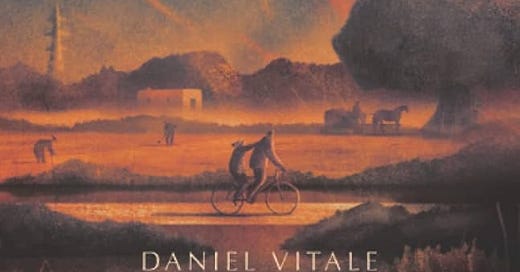Orphans of Canland by Daniel Vitale Review
A story about coming into your own with a dystopian backdrop
Orphans of Canland is Daniel Vitale’s debut novel about a near future where the planet has suffered an environmental collapse and civilization has splintered both geographically and ideologically. Characters are either part of WORLD or DOTEC (Diaspora of the Environmental Collapse). The two factions don’t exactly see eye-to-eye with each other. While WORLD prioritizes rebuilding nature with hopes of it eventually revitalizing civilization, the DOTEC would prefer to focus on bettering humanity. Unfortunately for the DOTEC, WORLD is a well-organized body of power while DOTEC are merely individuals.
The story focuses on Tristan, a 12-year-old with analgesia, a condition that prevents him from feeling physical pain and comes with a slew of developmental issues. He lives with his mother, Helena and older brother Dylan. The three of them are registered WORLD members but more than that, Helena is a co-founder of the agrarian desert-greening project in California known as the titular Canland. Moreover, she’s an outspoken politician espousing WORLD’s philosophies, which doesn’t win Tristan any favors with certain members in their community. Canland, WORLD, and the DOTEC are a mere backdrop, though.
The book is written from Tristan’s perspective, with each chapter acting as a kind of diary entry as Vitale uses him to get the reader accustomed to this rather immersive and fleshed-out world. Underneath this backdrop, the story really is about Tristan coming into his own. Despite the challenges he faces in this dystopian future with analgesia, a condition that prevents him from feeling any physical pain and comes with a number of developmental issues, he’s no different than every other child in real life who often see their home as a kind of paradise and parents as infallible. He experiences friendship, bullying—on a level most readers might not be familiar with merely because of who his mother is—first love, loss, and a shift in perspective. When this shift happens is when the reader starts to see the story Vitale is trying to tell.
I’ve read a few debut novels and even went to school with aspiring writers. So many of them make the same mistake, modeling their main protagonist into an ideal specimen of humanity. Vitale doesn’t do that here. He presents a fleshed out world with an intriguing and believable cast of characters. They’re relatable and you genuinely feel for Tristan. There are aspects of Tristan’s character development that reminded me of my own upbringing and made me empathize with him. Vitale’s writing is mature and thoughtful. It’s obvious he loves the craft of writing and takes it seriously.
However, he might have been a little too experimental with his prose at times. As I said, each chapter is written as a journal entry from Tristan. Maybe it’s realistic for a 12-year-old to change the way they write each entry or maybe there was an explanation I simply skipped over while getting lost in the world Vitale created. Either way, I think more consistency would have served the story better. Some chapters are written in a way that would have made Cormac McCarthy proud, without quotation marks, while others kept dialogue embedded within each paragraph, and others were more precise with quotation marks and indicators as to whom was speaking. Writing might have also been too flowery in some parts, but overall it was solid.
If you’re a fan of speculative fiction that deals with real-world themes, such as climate change and population control, you will definitely enjoy Orphans of Canland. If you’re a parent or somebody who has a different relationship with your parents now than you did as a child, this might be a book worth reading.




